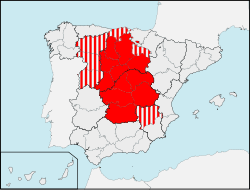Castilian
Castilian (span. Castellanos ) refers to the subjects of the historical crown of Castile or the inhabitants of today's geographical region of Castile in northern and central Spain .
Use of the term in a historical context
In the history of Spain, even after the union of the Castilian crown with the crown of Aragon (1469) and the establishment of the Kingdom of Spain (1516) , Castilians continued to have their own legal status for a long time, which differed greatly from that of the subjects of the Aragonese crown . For example, only residents of the Castilian, but not the Aragonese or (1580–1640) Portuguese regions of Spain received permission to travel to the Spanish overseas colonies in America , so that practically all Spanish conquistadors of the 16th century were Castilians (including numerous Basques and Asturians , Galicians, Extremes, Andalusians) and the Spanish conquest and colonization of South and Central America was largely Castilian (including all compatriots belonging to the Castilian crown). In the historical context up to the transformation of Spain into a central state, which began with the takeover of power by the Bourbon dynasty after the War of the Spanish Succession (1701–1714), it can therefore make sense to speak of "Castilians" (instead of "Spaniards") when Belonging to the Castilian crown is assumed or important in the respective context. This is also used in the German-speaking historical sciences.
Use of the term in a modern context
In addition to the geographical designation of origin "Castilian" (in the sense of "inhabitant of Castile" or "coming from Castile"), which is unproblematic, linguistic or even ethnic criteria have occasionally been used or postulated when using the term "Castilian" in German . In this sense, some authors have referred to Spanish nationals as Castilians or Castilian-Spaniards who are not native speakers of any of the regional Spanish languages (such as Basque , Galician or Catalan ). This use of the term is stimulated by the officially used alternative term Castilian ( castellano ) for the Spanish language . Such a construction of terms can lead to the idea of a linguistically identifiable “Castilian” ethnic group or group identity that is not accepted in Spain itself, especially since the Spanish (“Castilian”) linguistic area includes regions with very different regional identities from the extreme north to the extreme south of Spain .
The problem with this definition of Castilian, which is occasionally still to be found, is on the one hand the fact that this suggests an empirically untenable division of the population of Spain into different ethnic groups , and on the other hand that the geographical and political landscape of Castile ( Castile-La Mancha , Madrid , Castile and León ) only makes up part of the Spanish or “Castilian” language area in Spain.
Individual evidence
- ↑ For example in Der Fischer Weltalmanach 2003, Frankfurt am Main, Fischer Taschenbuch Verlag, 2002, Sp. 739; but no longer in Der Fischer Weltalmanach 2006, Frankfurt am Main, Fischer Taschenbuch Verlag, 2005, Sp. 426.
- ↑ Quotation from the Spanish constitution: "Art. 3. (1) Castilian is the official state language. All Spaniards have the duty to know it and the right to use it." ( www.verfassungen.de - Constitution of the Kingdom of Spain )

